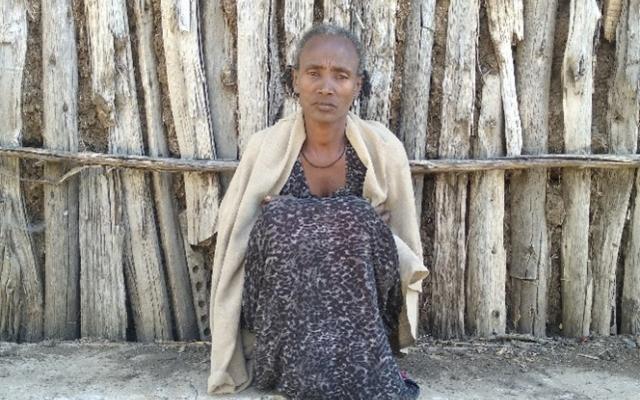The conflict in Tigray compounded by climate-fueled locust infestations and coronavirus has left millions of people in desperate need of humanitarian aid yet access to those affected continues to be restricted, warned Oxfam today.
Recent Oxfam assessments in South and West Tigray, as well as neighboring North Amhara, found that communities were already struggling to cope before the conflict erupted in November 2020.
Gezahegn Kebede Gebrehana, Oxfam’s Country Director in Ethiopia said:
“The three lethal Cs - conflict, coronavirus and climate change - have pushed millions of Ethiopians in Tigray to the brink. Even before the conflict, people had lost up to half their crops due to climate-fuelled plagues of locusts and they were struggling due to the devastating health and economic impacts of coronavirus. The conflict erupted in the middle of the harvest season, halting attempts to gather the remains of already depleted crops.”
“Families in South Tigray told us that they fled their homes in search of safety to neighbouring villages or the forest, surviving on little food and water. When they returned to their villages, they found that their homes and assets destroyed or looted.”

Almaz Ezegi, 55, a mother of 9 children living in Meso Bere village, Tigray region, is the breadwinner of the household. When the fighting started, Almaz and her family fled the area and didn’t return for a month. The fighting also meant that she was unable to access her HIV/AIDs medicine.Photo credit: Ysehaye/Oxfam 2021
“The three lethal Cs - conflict, coronavirus and climate change - have pushed millions of Ethiopians in Tigray to the brink."
Tesfay Getachew, a farmer in Tigray said: “Crops were burnt down in some places including mine. The total loss of my crop - an estimated 1.5 ton - could have fed my family of seven at least for ten months.”
The region was one of the worst-affected by the infestation of desert locusts which was bigger and more widespread due to extreme weather caused by climate change. The locusts were concentrated in the central and northwest zones of Tigray, and damaged crops, pastures and rangelands.
Before the conflict, over one million people in Tigray were reliant on aid and more than 600,000 were battling hunger. During the fighting these same people were cut-off from essential food rations they relied upon. There are now 4.5 million people in Tigray in need of urgent humanitarian assistance according to UN and regional government figures.
The conflict also disrupted essential public services such as health, education and water supply. Women and girls have to travel long distances to fetch water and support their family needs. This has added to the burden of unpaid care work. There are also fears for their safety and protection because of insecurity.
Gebrehana said: “Public sector workers have not received their salaries for three months making it increasingly impossible for them to cope with the pandemic. Because of insecurity and lack of cash, people could not reach markets and the price for basic goods skyrocketed.”
Despite the urgent need for food, shelter and support to make a living, humanitarian relief efforts are currently hampered as agencies have not been granted full access to Tigray due to ongoing fighting and insecurity, bureaucratic hurdles and a blackout in communications.
Oxfam urges both parties to the conflict to agree to a cessation of hostilities and negotiate a peaceful resolution to this crisis. Both parties must respect international humanitarian and human rights law and allow aid agencies safe access to reach affected people quickly.
Oxfam also calls upon the international community to support the humanitarian response in Ethiopia to help quickly mobilize resources and save lives. To date, the $116m UN humanitarian appeal for Northern Ethiopia is 35 percent underfunded.
Oxfam urgently needs $10.2 million to provide clean water, sanitation and hygiene support as well as food assistance to over 225,000 people in Tigray and neighboring regions of Amhara and Afar.
Notes to editors
- The figures of those in urgent humanitarian need are based on UN OCHA
- and the Tigray regional government official data.
- Since the early 1970s, Oxfam has been working in Ethiopia to save lives and help over 1.8 million most vulnerable people out of poverty. Working closely with partners, we provide clean water, sanitation, and food, as well as assist marginalized farmers to get out of poverty through long term development projects. Oxfam works on ending the gender injustices and helping women.
- The disruption in the distribution of humanitarian supplies is contributing to the worsening of the humanitarian context, as it prevents timely and adequate assistance to vulnerable communities. Currently, 1.8 million Ethiopians are already internally displaced due to previous conflict and climatic factors according to UNOCHA.
Contact information
Spokespersons are available. Please contact:
Martin Namasaka, Regional Media and Communications Advisor +254736666663, martin.namasaka@oxfam.org
For updates, please follow @Oxfam
- The figures of those in urgent humanitarian need are based on UN OCHA
- and the Tigray regional government official data.
- Since the early 1970s, Oxfam has been working in Ethiopia to save lives and help over 1.8 million most vulnerable people out of poverty. Working closely with partners, we provide clean water, sanitation, and food, as well as assist marginalized farmers to get out of poverty through long term development projects. Oxfam works on ending the gender injustices and helping women.
- The disruption in the distribution of humanitarian supplies is contributing to the worsening of the humanitarian context, as it prevents timely and adequate assistance to vulnerable communities. Currently, 1.8 million Ethiopians are already internally displaced due to previous conflict and climatic factors according to UNOCHA.
Spokespersons are available. Please contact:
Martin Namasaka, Regional Media and Communications Advisor +254736666663, martin.namasaka@oxfam.org
For updates, please follow @Oxfam